Overview of EIN Civil Society Briefing March 2022
/On the 3rd March 2022, EIN held a civil society briefing for Permanent Representatives of the Council of Europe, ahead of the Committee of Minister’s Human Rights Meeting on 8-10 March 2022.
The Briefing focused on the following cases:
M.A. v. France, presentation by Paul Chiron, in charge of legal support at La Cimade.
Tsintsabadze v. Georgia, presentation by Tamar Oniani, Head of the International Litigation Team at the Georgian Young Lawyers Association (GYLA) and Tamar Abazadze, Head of Analytical Department at the Public Defender Office (PDO)
Ramazanova and others v. Azerbaijan, presentation by Nora Wehofsits, International Advocacy Officer, Human Rights House Foundation (HRHF), and Anar Mammadli, Co-Founder and Senior Advisor, Election Monitoring and Democracy Studies Center (EMDS). The NGOs are calling, in their rule 9.2 Communications, for having it moved from the standard procedure to the enhanced procedure.
Lashmankin and others v. Russia, presentation by EIN Director, George Stafford.
M.A. v France
The case concerns the enforcement on 20 February 2015 of a removal order against the applicant, an Algerian national, who was sentenced in 2006 in France to seven years’ imprisonment and to permanent exclusion from French territory for terrorism-related acts.
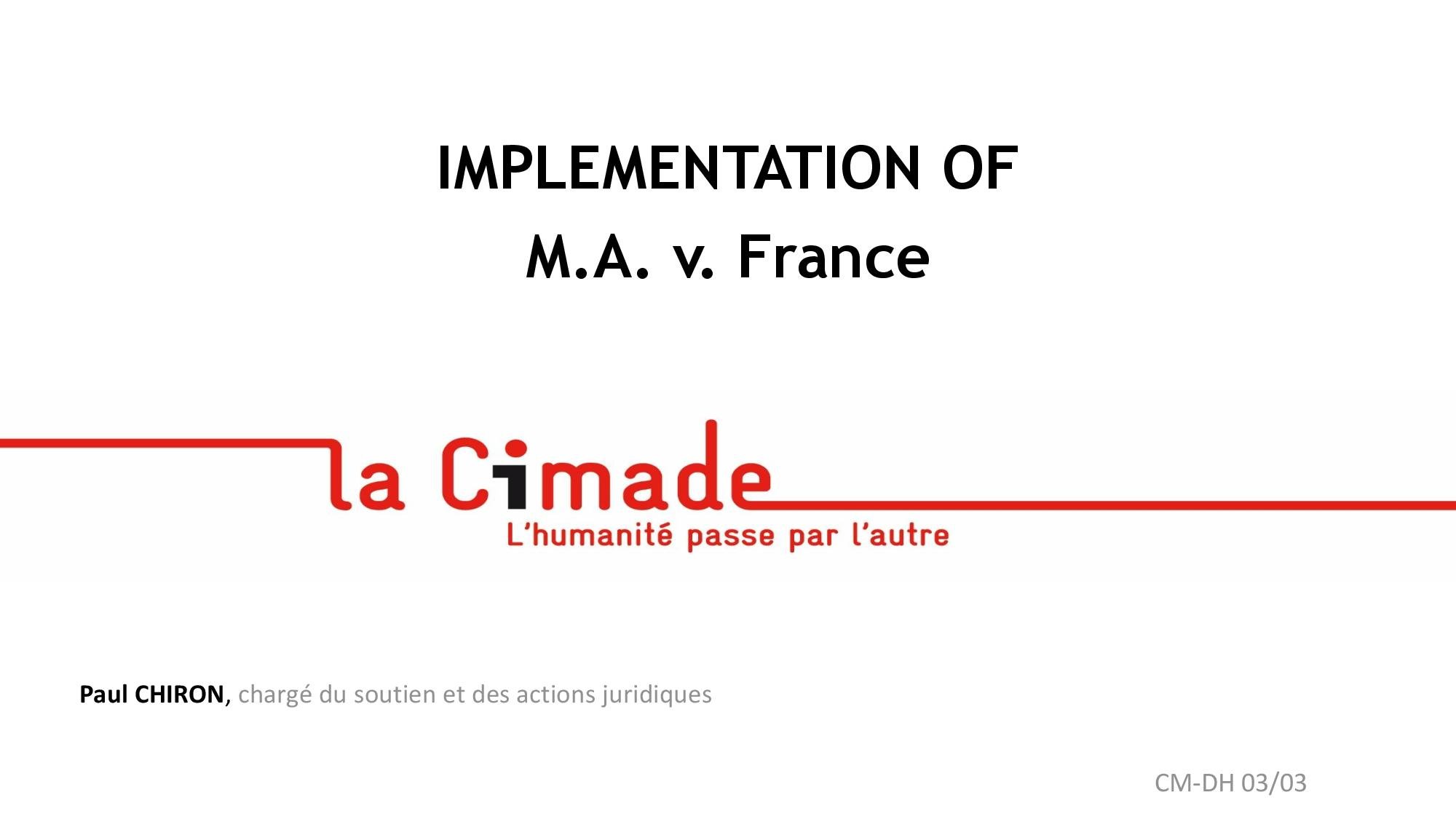
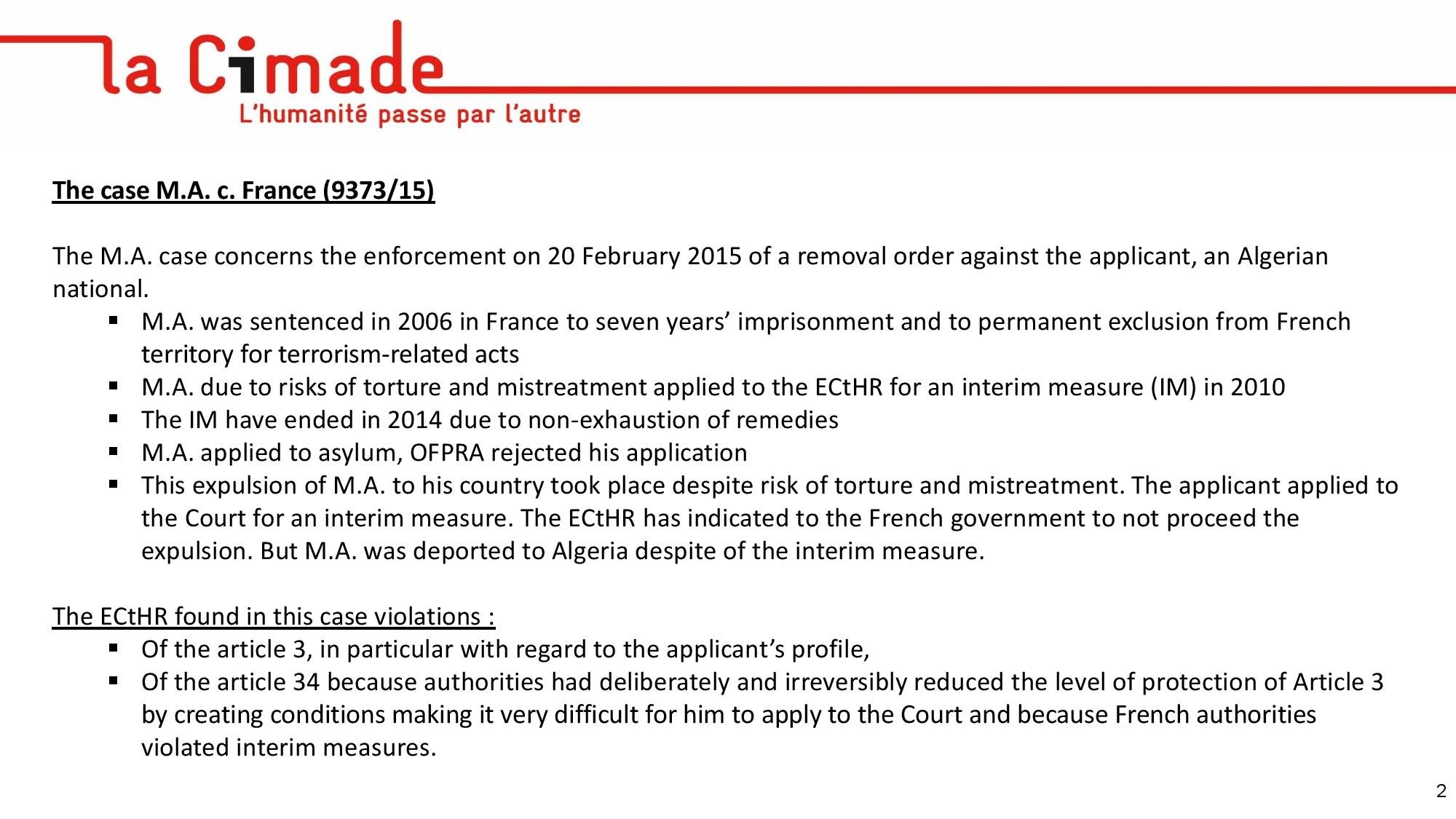
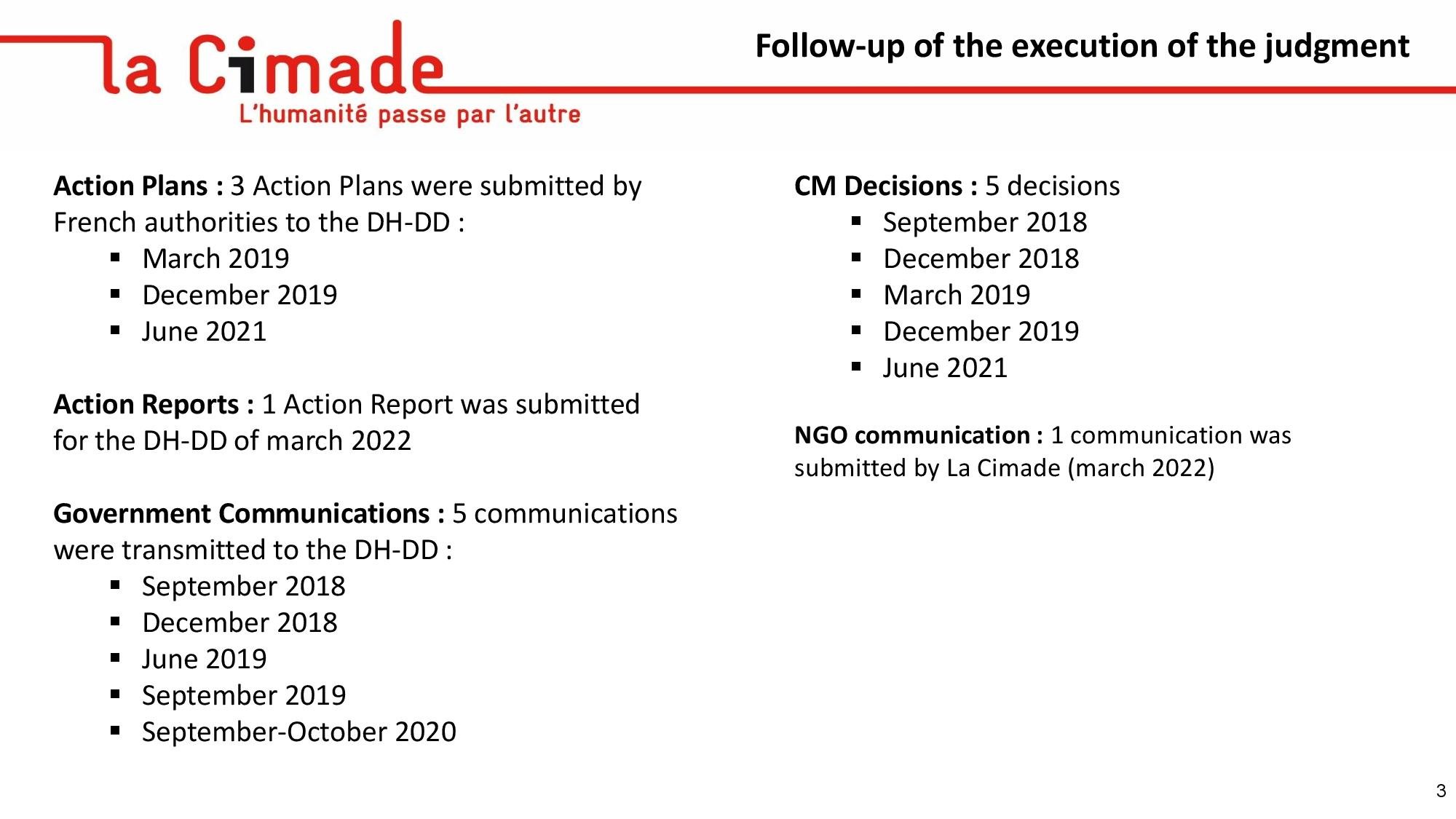
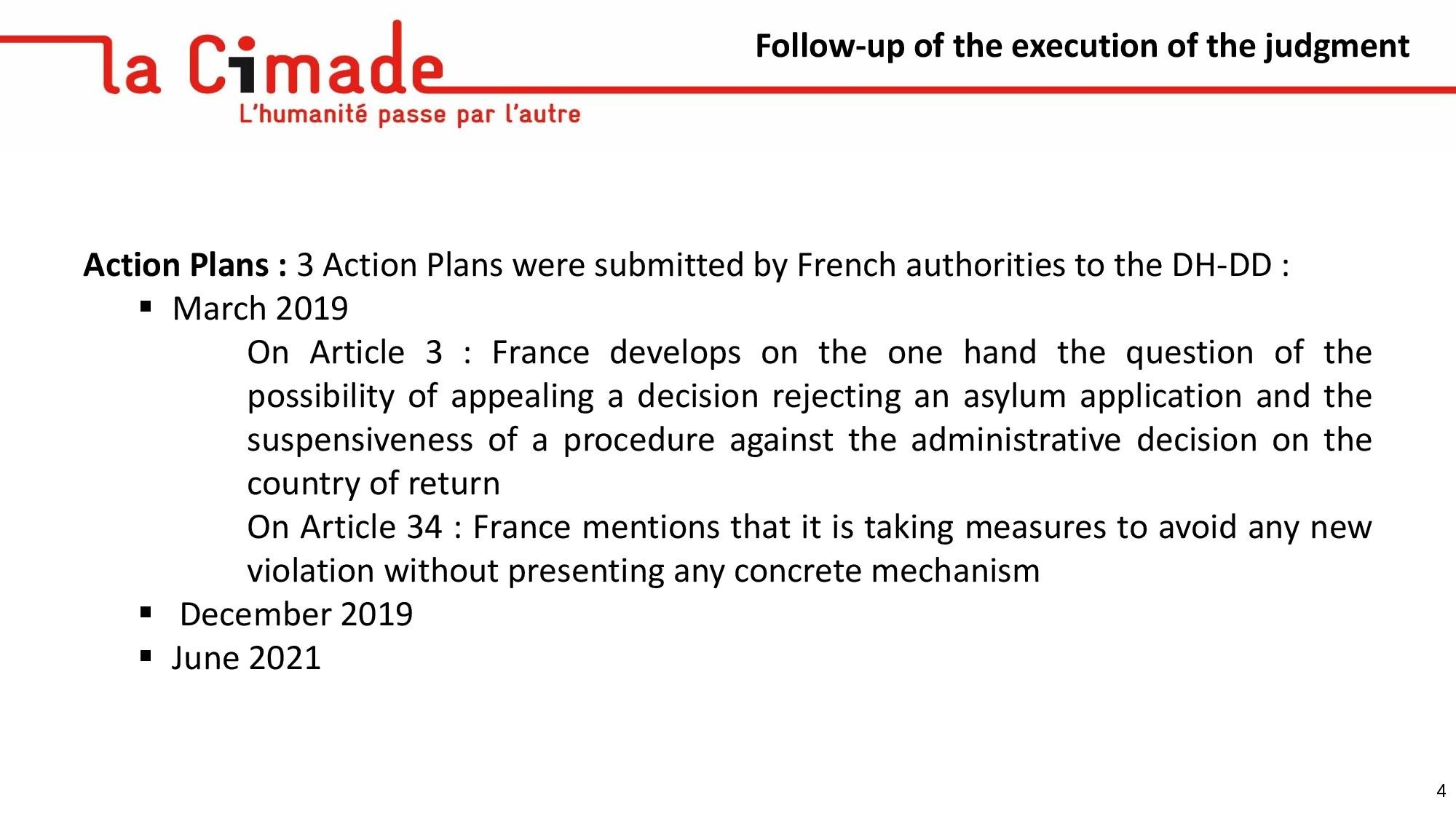
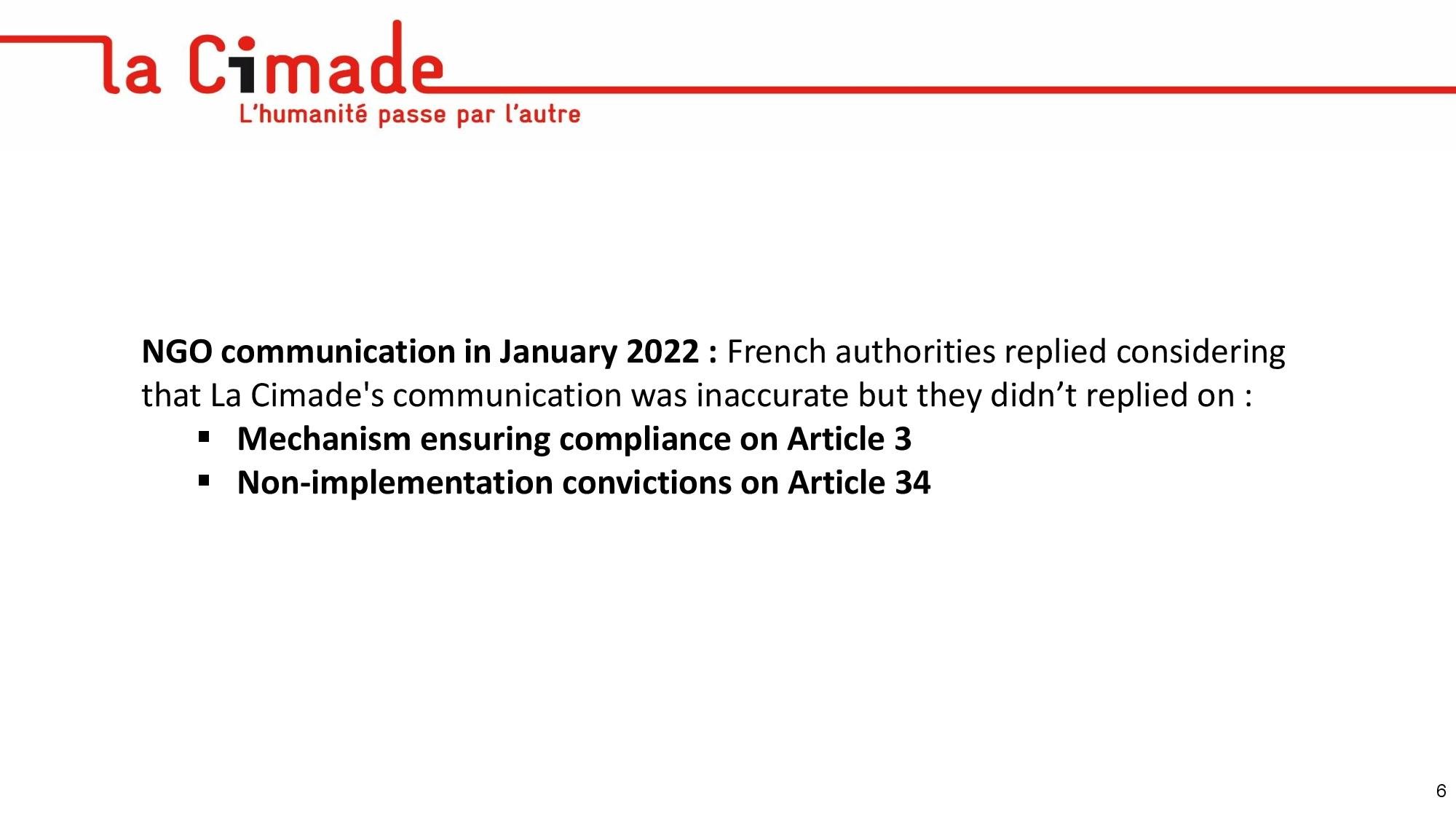
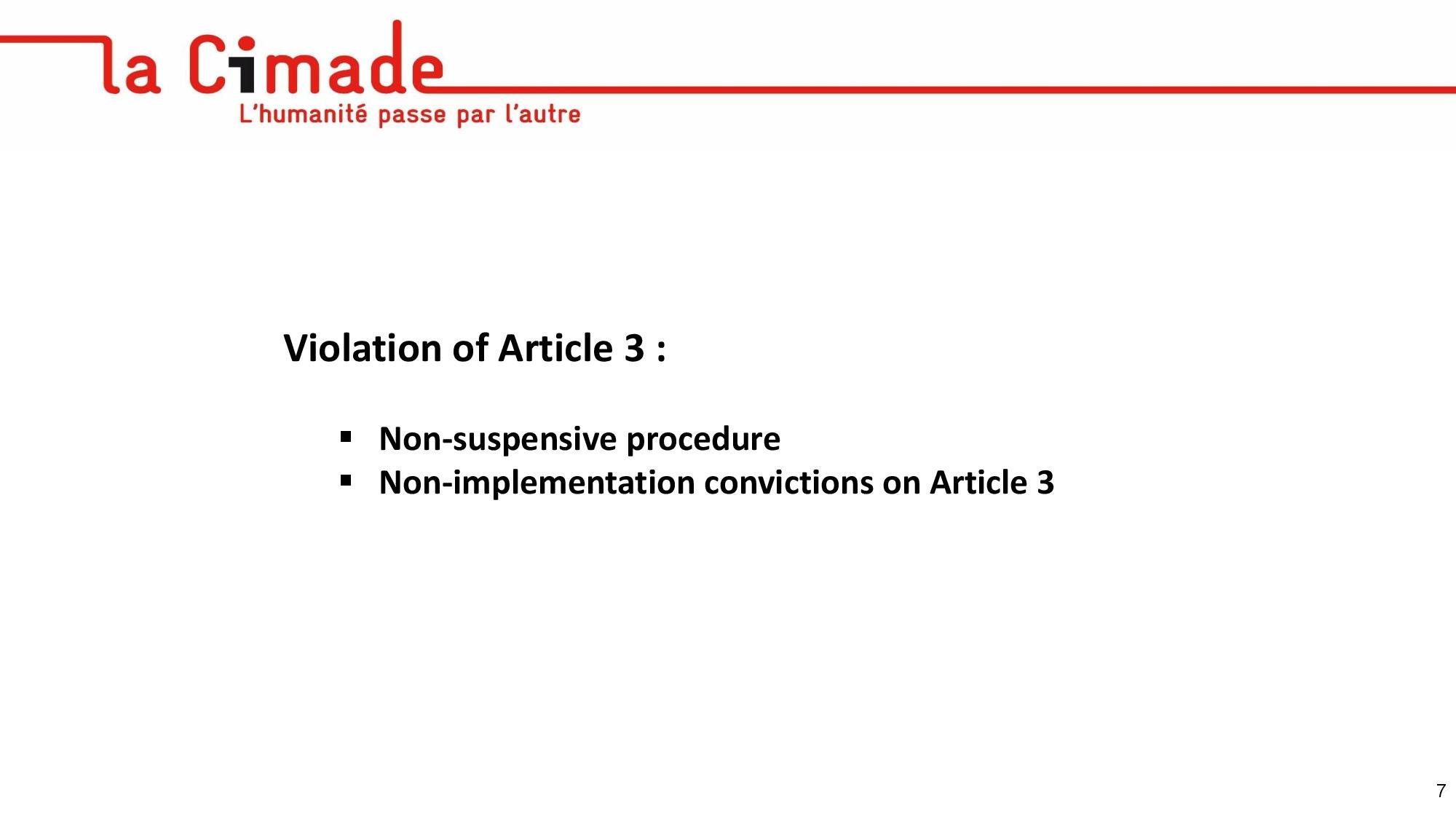
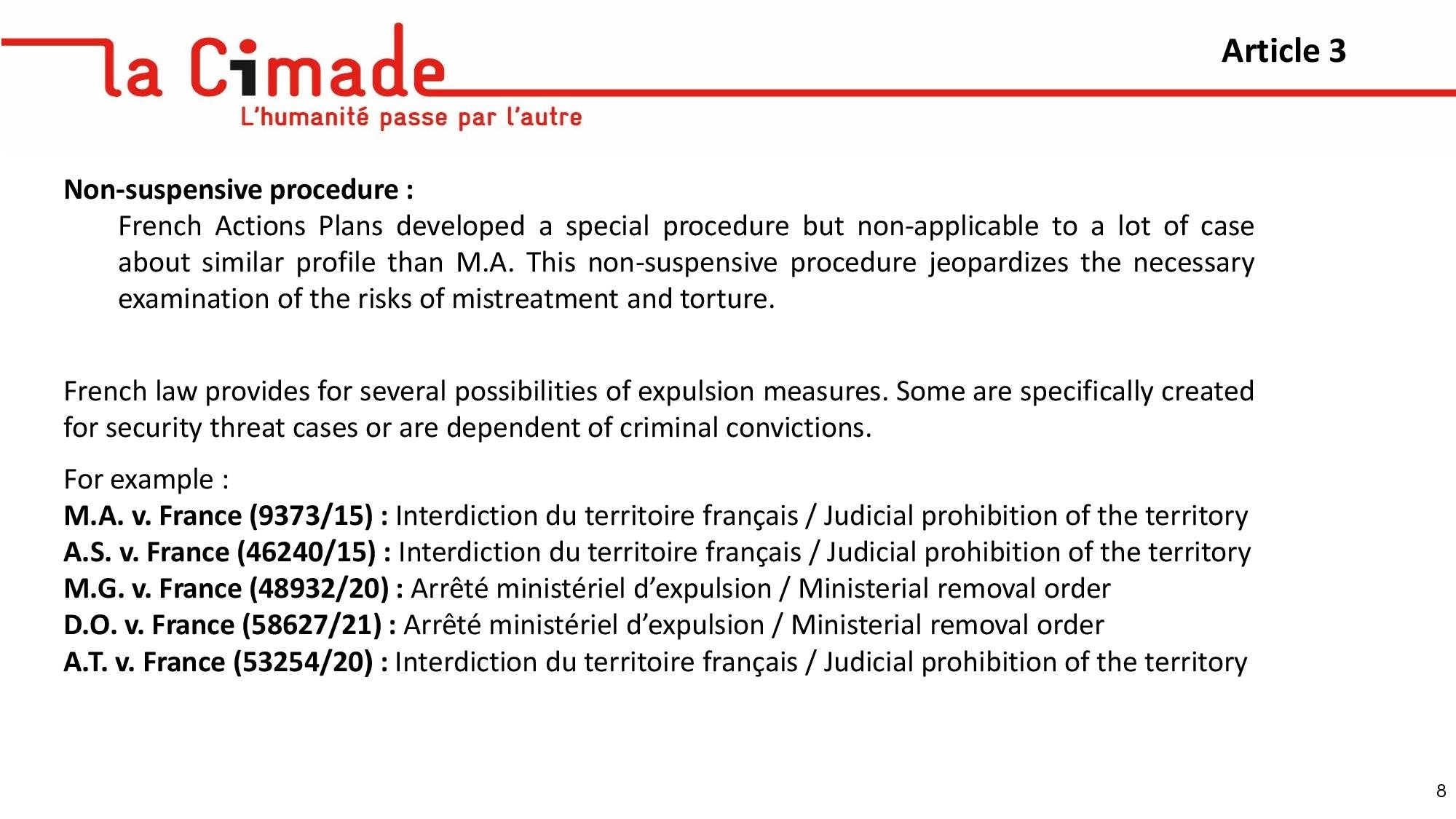
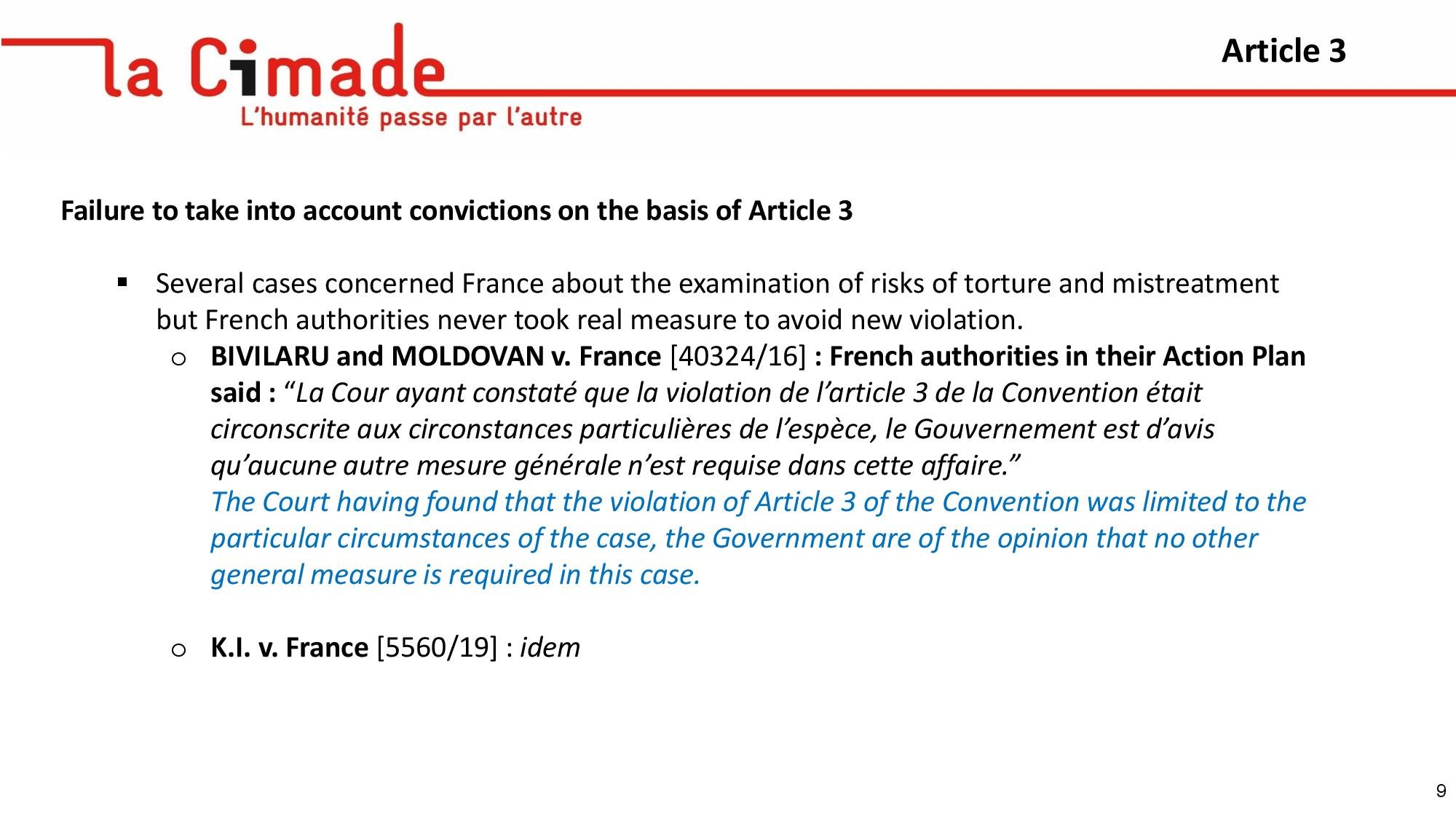
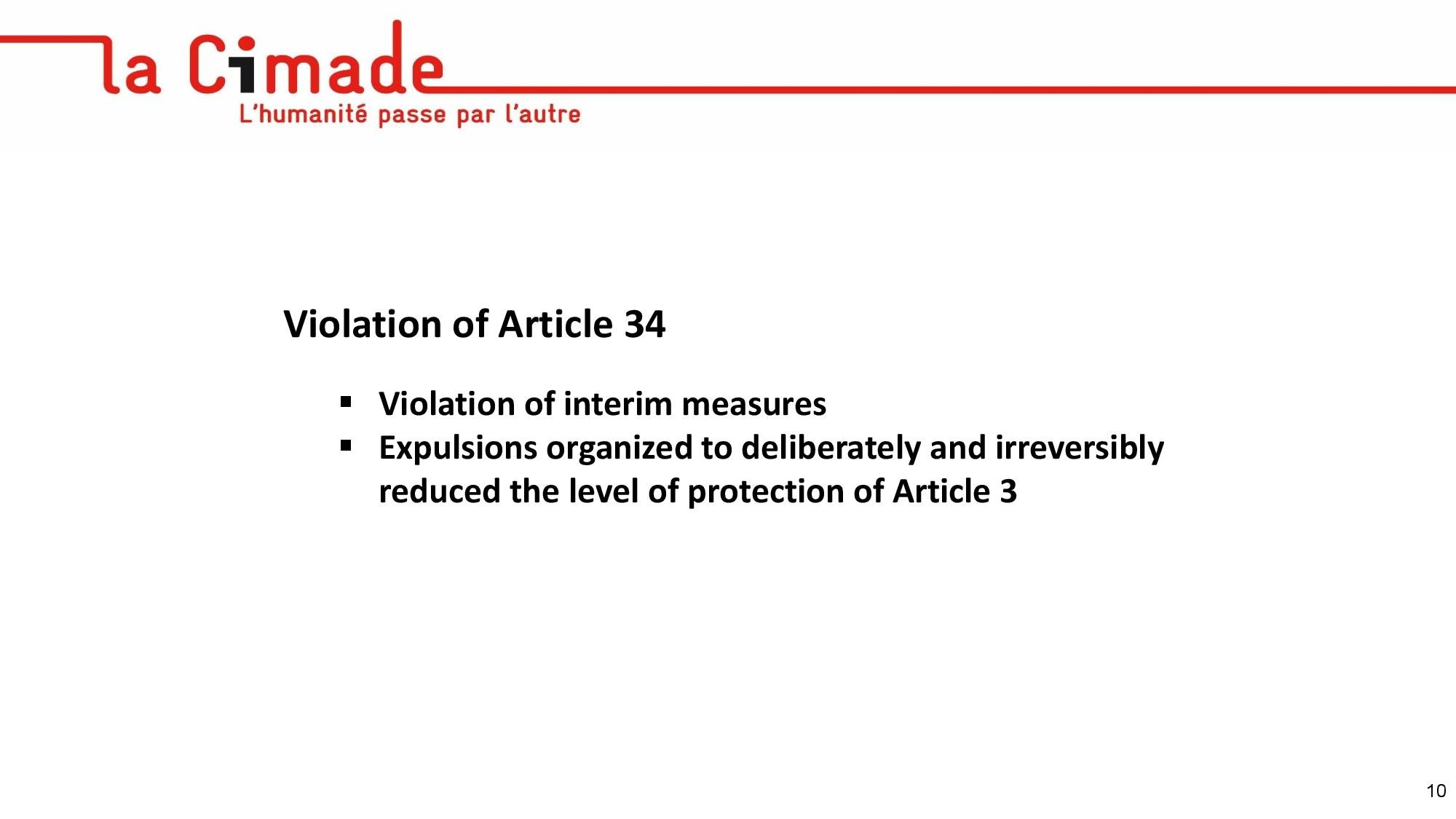
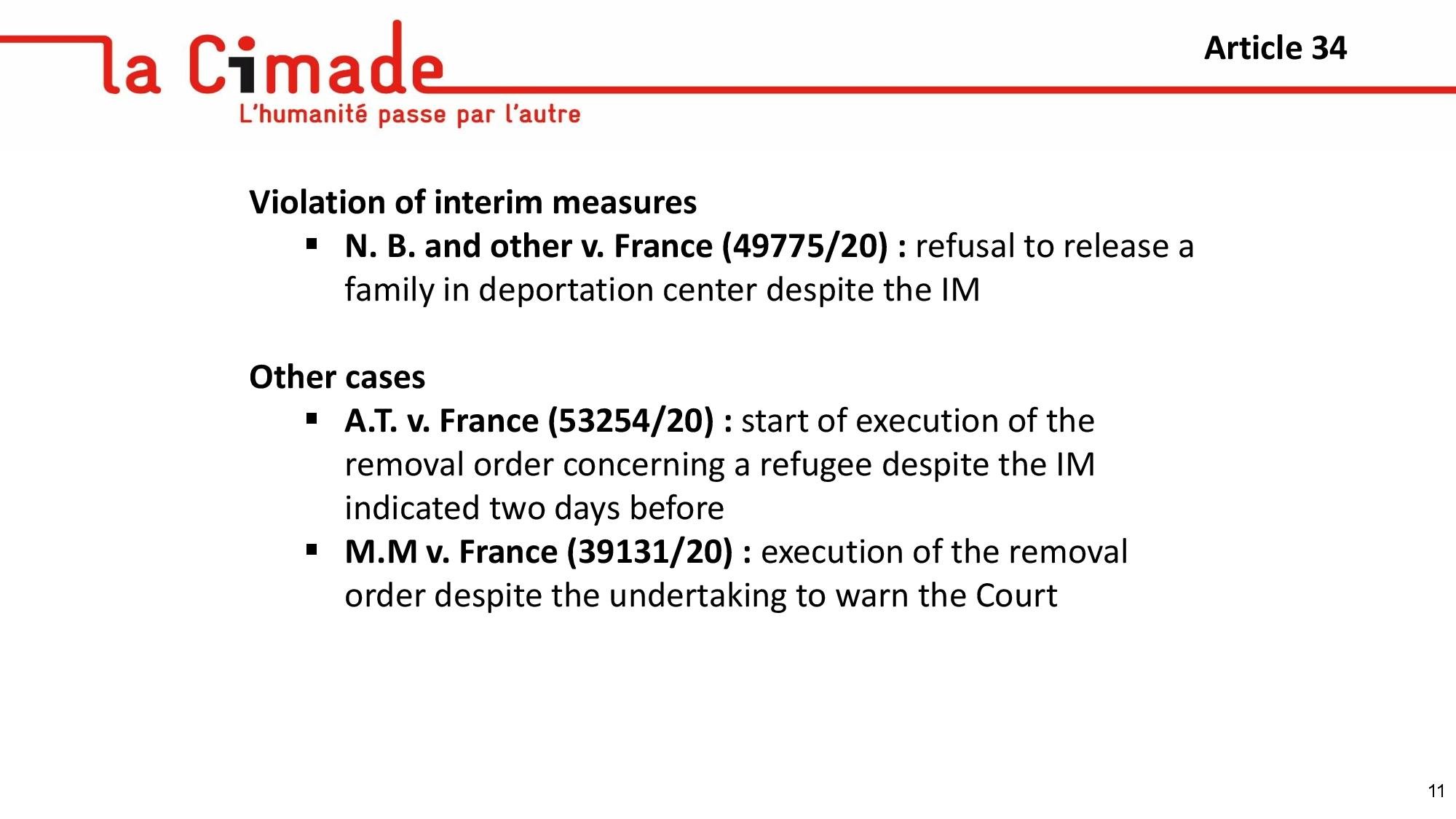
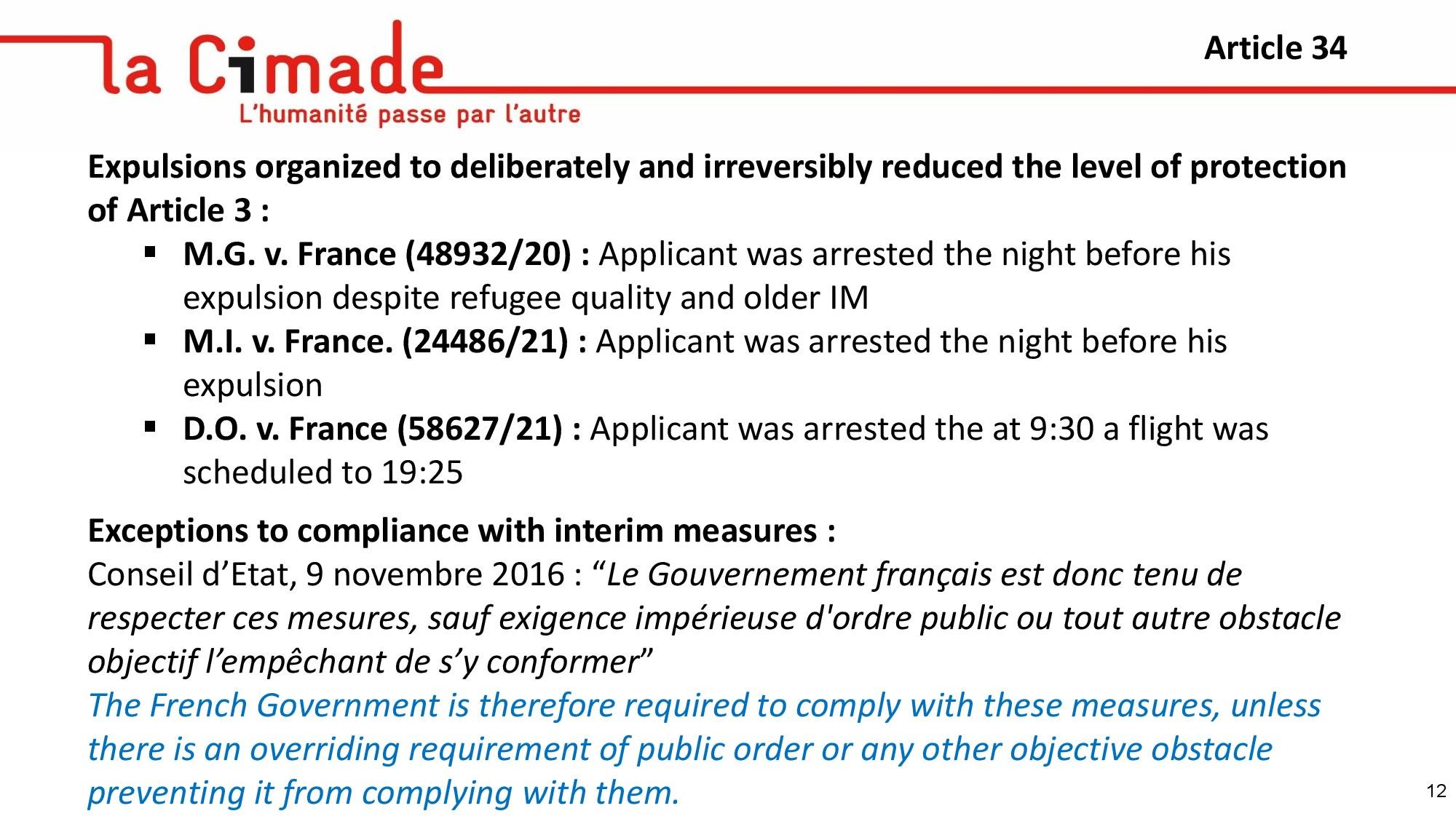
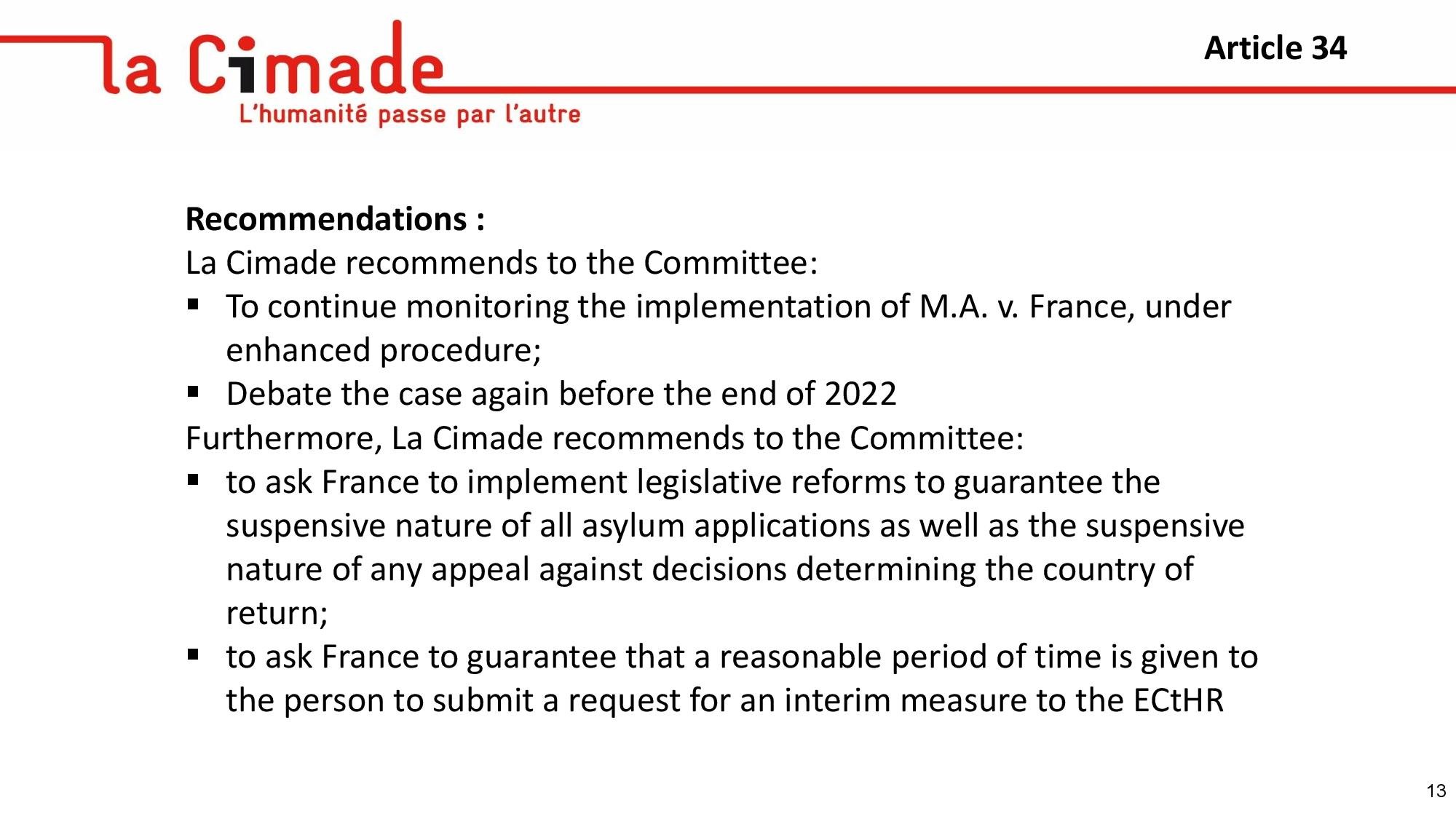
Overview of the Briefing
La Cimade reminded participants of the European Court of Human Rights judgments in finding the following violations :
Article 3, in particular with regard to the applicant’s profile, who was not merely suspected of having links with terrorism but had actually been convicted in France for serious acts of which the Algerian authorities were aware. The Court considered there was a genuine and serious risk that, if detained, he would be exposed to treatment contrary to that provision.
Article 34, with regard to the fact that authorities had deliberately and irreversibly reduced the level of protection of Article 3 by creating conditions making it very difficult for him to apply to the Court, and because French authorities violated interim measures.
La Cimade outlined ongoing issues:
Violation of Article 3
Non-suspensive procedure
French authorities developed a special procedure but it is non-applicable to a lot of cases with a similar profile to M.A. This non-suspensive procedure jeopardizes the necessary examination of the risks of mistreatment and torture.
Failure to take into account convictions on the basis of Article 3
There have been several ECtHR cases concerning France about the examination of risks of torture and mistreatment. However, French authorities never took real measures to avoid new similar violations.
Violation of Article 34
New Interim measures have been disregarded and violated:
Example: N. B. and other v. France (49775/20), refusal to release a family in deportation center despite the interim measure.
New expulsions have been organized to deliberately and irreversibly reduced the level of protection of Article 3
Examples:
M.G. v. France (48932/20), the applicant was arrested the night before his expulsion despite refugee quality and older IM
M.I. v. France. (24486/21), the applicant was arrested the night before his expulsion
D.O. v. France (58627/21), the applicant was arrested at the 9:30 and a flight was scheduled to 19:25
La Cimade recommends to the Committee of Ministers:
To continue monitoring the implementation of M.A. v. France under enhanced procedure;
To debate the case again before the end of 2022;
To ask France to implement legislative reforms to guarantee the suspensive nature of all asylum applications, as well as the suspensive nature of any appeal against decisions determining the country of return;
To ask France to guarantee that a reasonable period of time is given to the person to submit a request for an interim measure to the ECtHR.
Please see the slides for the full Briefing.
Relevant Information
CM Decisions
NGO/NHRI Communications
Tsintsabadze v Georgia
This case concerns the lack of effective investigations into allegations of ill-treatment or violations of the right to life; excessive use of force by the police in the course of arrest and/or while detaining suspects.
Overview of the Public Defender’s Office Briefing
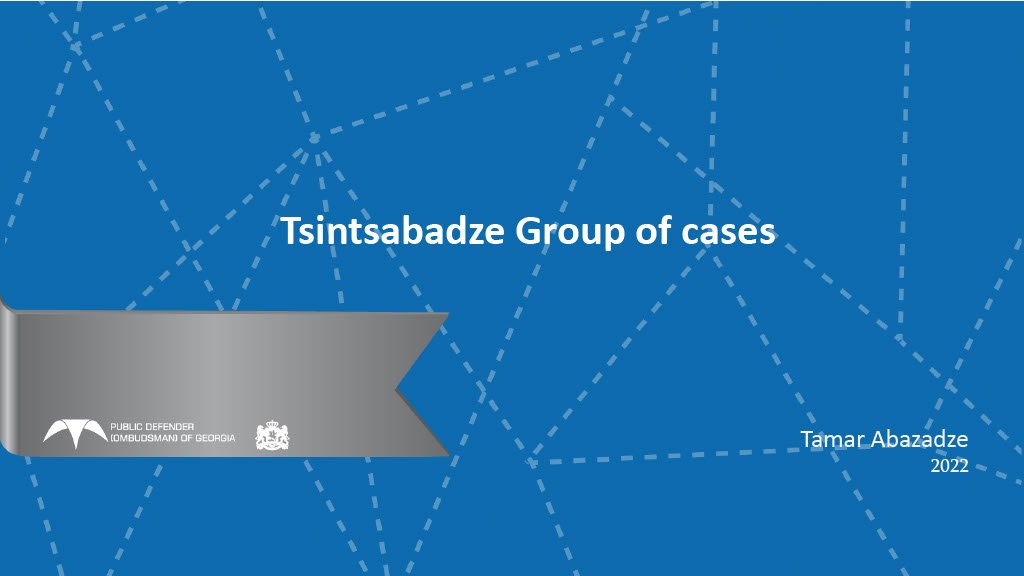
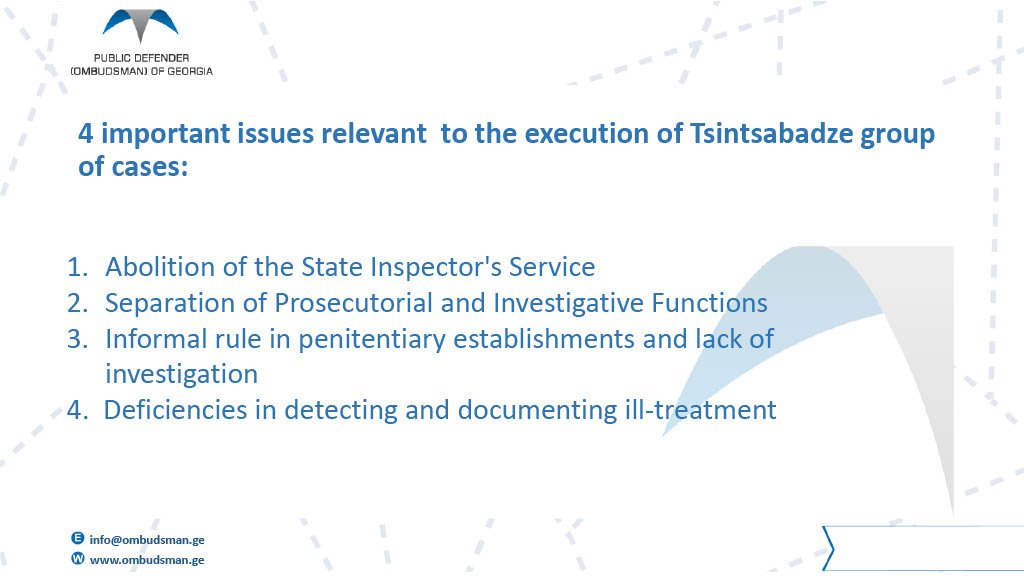
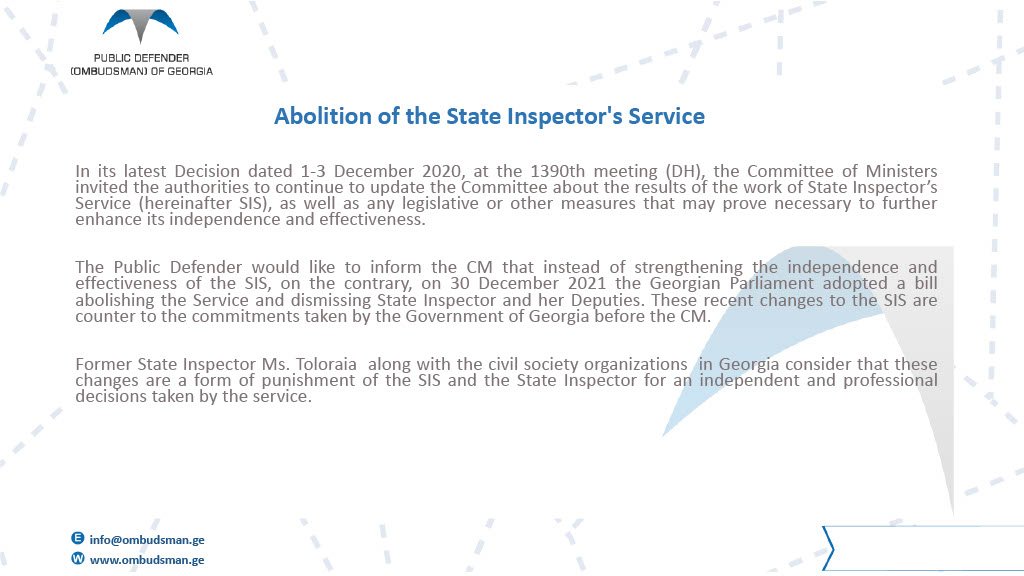
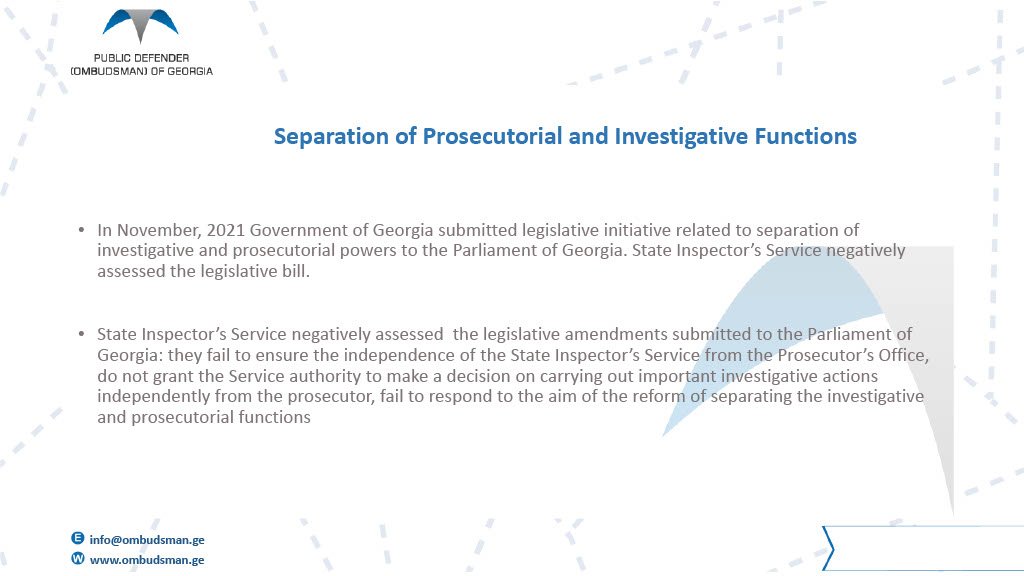
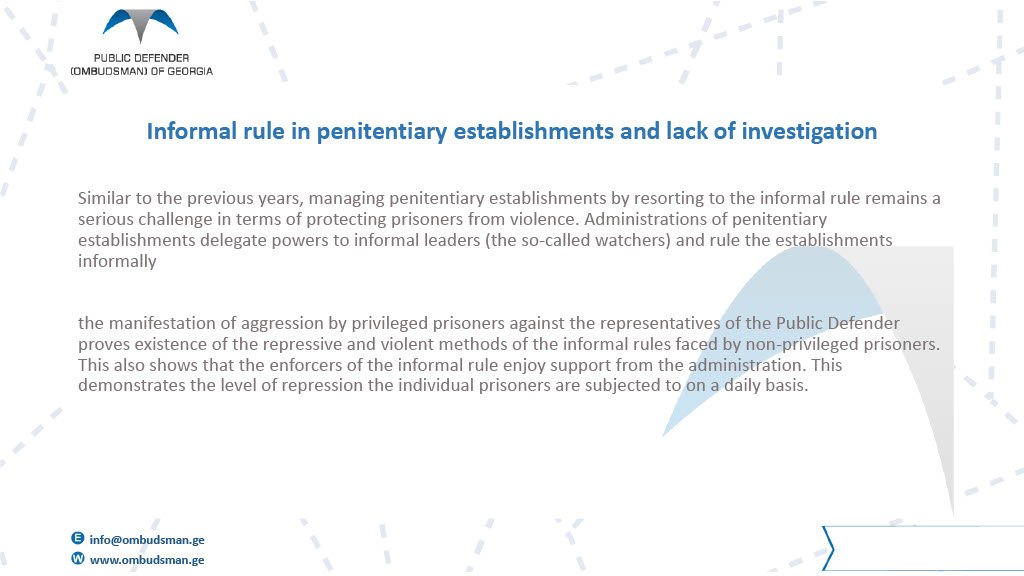
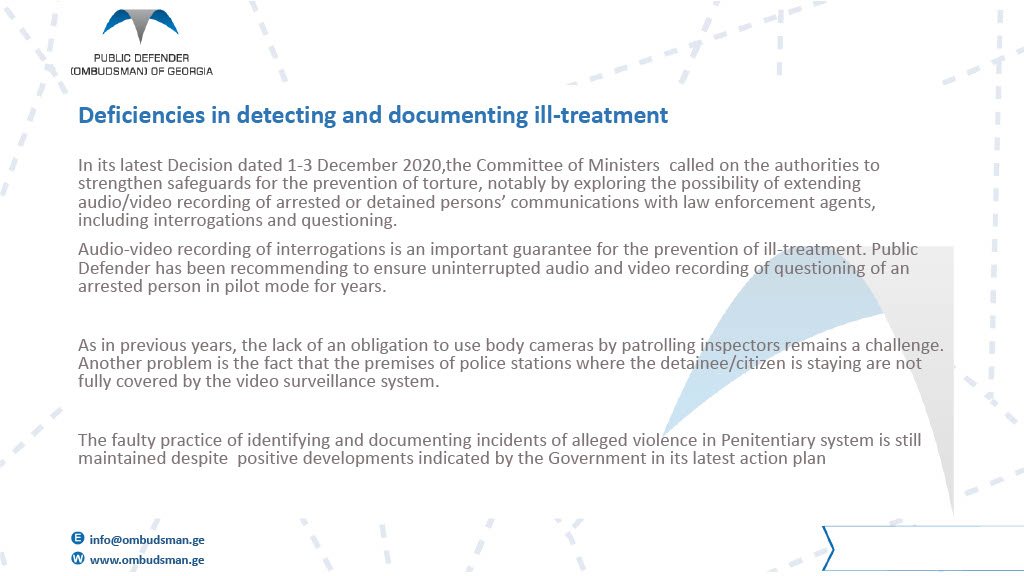
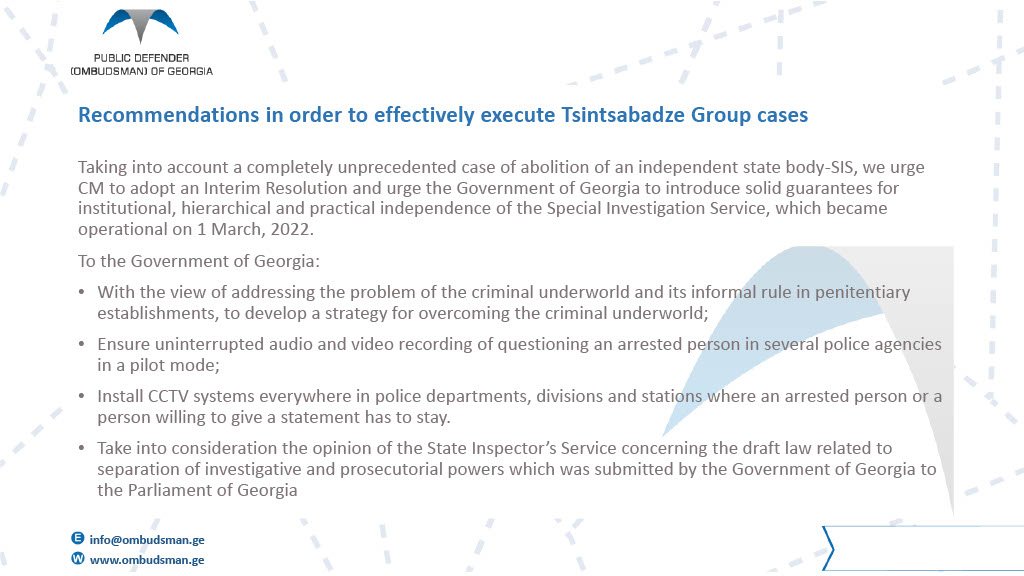

The PDO outlined four important issues relevant to the execution of the case:
Abolition of the State Inspector's Service
Instead of strengthening the independence and effectiveness of the SIS, on the contrary, on 30 December 2021, the Georgian Parliament adopted a bill abolishing the Service and dismissing State Inspector and her Deputies. These recent changes to the SIS are counter to the commitments taken by the Government of Georgia before the CM.
Separation of Prosecutorial and Investigative Functions
The current proposed legislative amendments fail to ensure the independence of the State Inspector’s Service from the Prosecutor’s Office, do not grant the Service authority to make a decision on carrying out important investigative actions independently from the prosecutor, fail to respond to the aim of the reform of separating the investigative and prosecutorial functions
Informal rule in penitentiary establishments and lack of investigation
Similar to the previous years, managing penitentiary establishments by resorting to the informal rule remains a serious challenge in terms of protecting prisoners from violence. Administrations of penitentiary establishments delegate powers to informal leaders (the so-called watchers) and rule the establishments informally.
4. Deficiencies in detecting and documenting ill-treatment
The faulty practice of identifying and documenting incidents of alleged violence in Penitentiary system is still maintained despite positive developments indicated by the Government in its latest action plan.
The PDO’s Recommendations in order to effectively implement Tsintsabadze Group cases:
Taking into account a completely unprecedented case of abolition of an independent state body - the SIS -, we urge the CM to adopt an Interim Resolution and urge the Government of Georgia to introduce solid guarantees for institutional, hierarchical and practical independence of the Special Investigation Service, which became operational on 1 March, 2022.
To the Government of Georgia:
With the view of addressing the problem of the criminal underworld and its informal rule in penitentiary establishments, to develop a strategy for overcoming the criminal underworld;
Ensure uninterrupted audio and video recording of questioning of arrested persons in several police agencies in a pilot mode;
Install CCTV systems everywhere in police departments, divisions and stations where an arrested person or a person willing to give a statement has to stay.
Take into consideration the opinion of the State Inspector’s Service concerning the draft law related to separation of investigative and prosecutorial powers which was submitted by the Government of Georgia to the Parliament of Georgia.
Please see the slides for the full Briefing.
Overview of the GYLA’s Briefing
GYLA reminds participants of the 3 key problems at the national level, from their communication to the CM:










The abolition of the State Inspector’s Service (SIS) in December 2021;
On December 30, 2021, the Georgian Parliament, in a peremptory manner, without previous consultations with the SIS and/or other stakeholders, including civil society, and despite sharp criticism from local civil society organizations and Georgia’s partner states, adopted legislative amendments according to which the State Inspector’s Service is abolished in its current form and two new offices are created, which will be responsible for protecting personal data and investigating crimes against law enforcement.
The strengthening of the criminal subculture in the penitentiary establishments;
Increased influences of the criminal subculture in penitentiary institutions endanger the physical and psychological inviolability of prisoners, and, remarkably, the prosecutor’s office usually does not respond appropriately or effectively to crimes committed by criminal subcultures and the employees of penitentiary institutions. This undermines the principle of the rule of law, and puts a group of prisoners in danger - those who are not a part of the criminal underworld.
The national legislation’s failure to preclude granting an amnesty or pardon by State officials who are responsible for grave human rights violations.
In September, the Amnesty Law was adopted with regards to June 20 cases. The application of an amnesty to state agents who have committed violations of inhuman or degrading treatment (regardless of whether they are properly qualified as crimes at the national level) is itself contrary to Article 3 of the Convention, as it will preclude the investigation into such crimes and lead to impunity of those accountable. Such an outcome makes the safeguards generated by the prohibition of ill-treatment illusory and will have a chilling effect on those individuals considering exercising their peaceful enjoyment to freedom of assembly.
GLYA’s Recommendations for the execution of general measures:
The authorities should ensure the independence of the Special Investigation Service (legal successor institution of SIS in the field of investigation). They should provide it with the mandate to eradicate:
The lack of jurisdiction regarding high-ranking officials and the prosecutor’s office;
The problems related to its investigative jurisdiction;
The continued control of the Prosecutor’s Office over the investigation process and its exclusive power to conduct the prosecution;
The lack of authority to conduct investigations into certain categories of crimes; and
The problems related to the unhindered access of the State Investigation Service staff to penitentiary institutions and temporary detention facilities.
All necessary measures should be carried out in a timely manner to reduce the level and influence of criminal underworld and tackle ‘informal governance’ in Georgian prisons, including with the engagement of civil society and other stakeholders. To that end, a plan and strategy should be developed, which will provide for detailed measures to be taken by the state. Furthermore, the number of prison employees should be increased, and they should be provided with appropriate continuing education for their professional and educational development.
Legislative changes should be made, which would in future preclude granting an amnesty or pardon to State officials who are held to be responsible for grave crimes committed against life and health, as well as torture, inhuman treatment, and punishment.
Please see the slides for the full Briefing.
Relevant Information
CM Decisions
NGO/NHRI Communications











This case concerns violations of the right to freedom of association on account of the failure of the authorities to apply properly the national legislation regulating the registration / the dissolution of the associations. In particular, the repeated failure, of the Ministry of Justice to take a definitive decision, or to respond within the statutory time-limits, amounted to de facto refusals to register the associations.
Overview of the Briefing
HRHF and EMDS reminded participants of the current situation and ECtHR findings:
Currently under standard supervision
6 judgements address arbitrary prolongation of registration procedure for associations
No sufficient grounds to dissolve associations
Repeated registration refusals, problems to receive legal status or grants/financial donations
Domestic law on registration unclear and open to interpretation
HRHF and EMDS reminded participants of the General Measures that still need to be actioned:
Duty of the Government of Azerbaijan to take remedial measures for improved compliance with the time-limits imposed by the State’s own law.
No evidence in the relevant cases.
Allegedly heavy workload no excuse for infringements of procedural requirements of domestic law.
Domestic law must delimit precisely the circumstances in which sanctions could be applied.
NGO Act to provide procedural safeguards against the risk of abuse & arbitrariness.
Procedure for conducting inspections by the MoJ on period of time should be prescribed by law.
EMDS outlines to participants the current state of affairs in Azerbaijan:
Freedom of association violations <-> legislative framework of NGO operation in the country
Quality of the law allows state interference and misuse in implementation
Entirety of the laws + legislation: interdependent, unified tool for persecution
NGO registration + reporting requirements, power of the MoJ to supervise/monitor/control work of NGOs
Disintegration of financial independence & sustainability of NGOs. Limits to grant giving donors. No international civil society donor registered.
High fines for breach of operational requirements
Intimidation of NGOs - atmosphere of fear and insecurity
Situation aggravated by enforcement mechanisms allowing action against undesirable associations.
HRHF and EMDS made the following recommendations to the CM:
Move Ramazanova group of cases from standard to enhanced supervision procedure.
Ask Azerbaijan to amend domestic legislation regulating NGOs, international & donor organizations
Address continuous & systemic freedom of association violations in Azerbaijan by:
Abolishing current procedures for registering NGOs/grants/donations, replacing it with a simple notification procedure
Removing burdensome requirements for registration + operation of international donors
Facilitating access to funding for NGOs by removing prior approval process for international donors
Repealing disproportionate & punitive sanctions for violations of domestic legislation
Safeguarding freedom of expression & assembly of NGOs
Please see the slides for the full Briefing.
Relevant Information
NGO/NHRI Communications
Lashmankin & others v Russia
This case concerns different violations mainly related to the right to freedom of peaceful assembly (reactions to notifications of planned assemblies, reactions to peaceful assemblies, unlawful arrests).
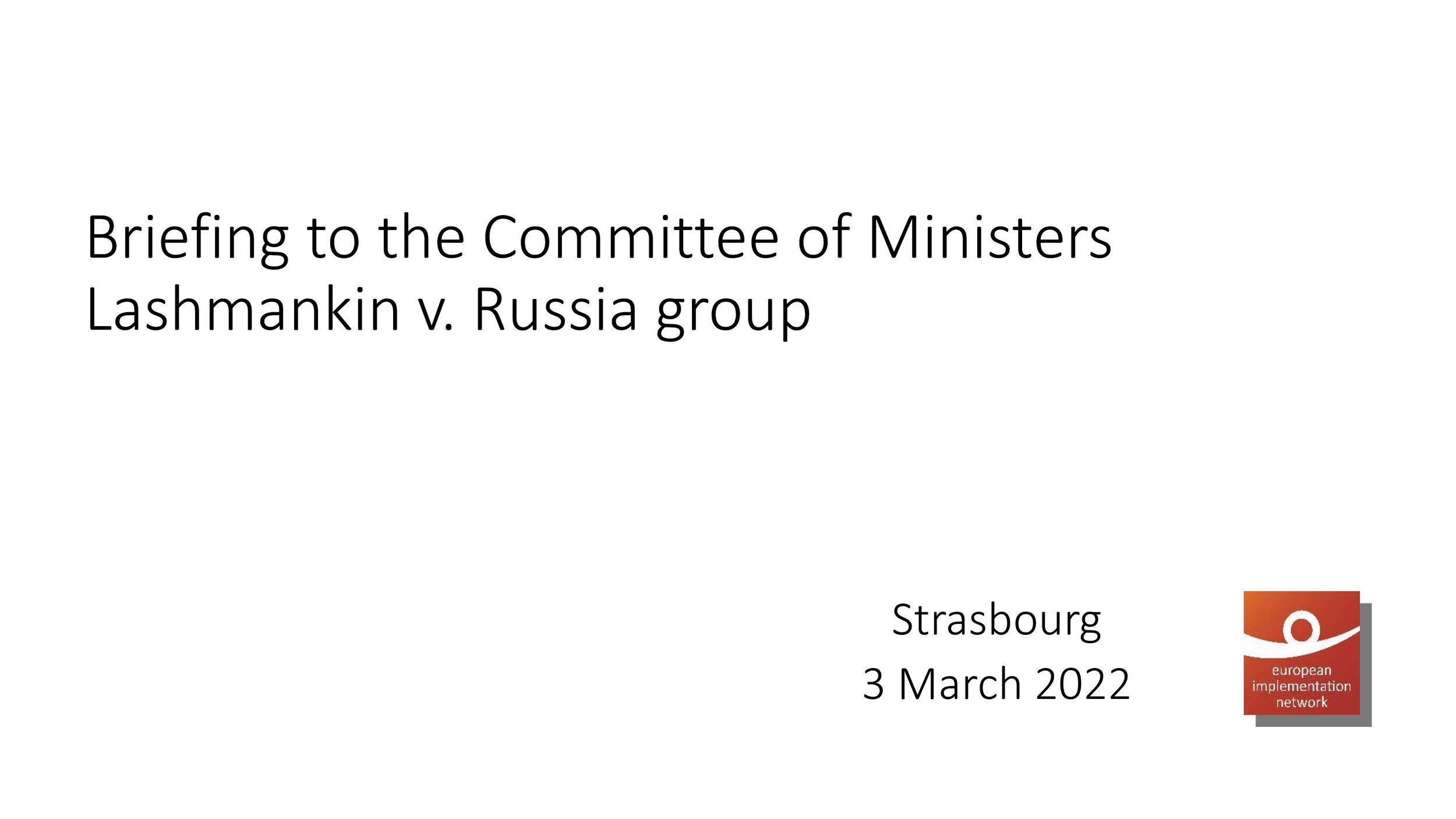
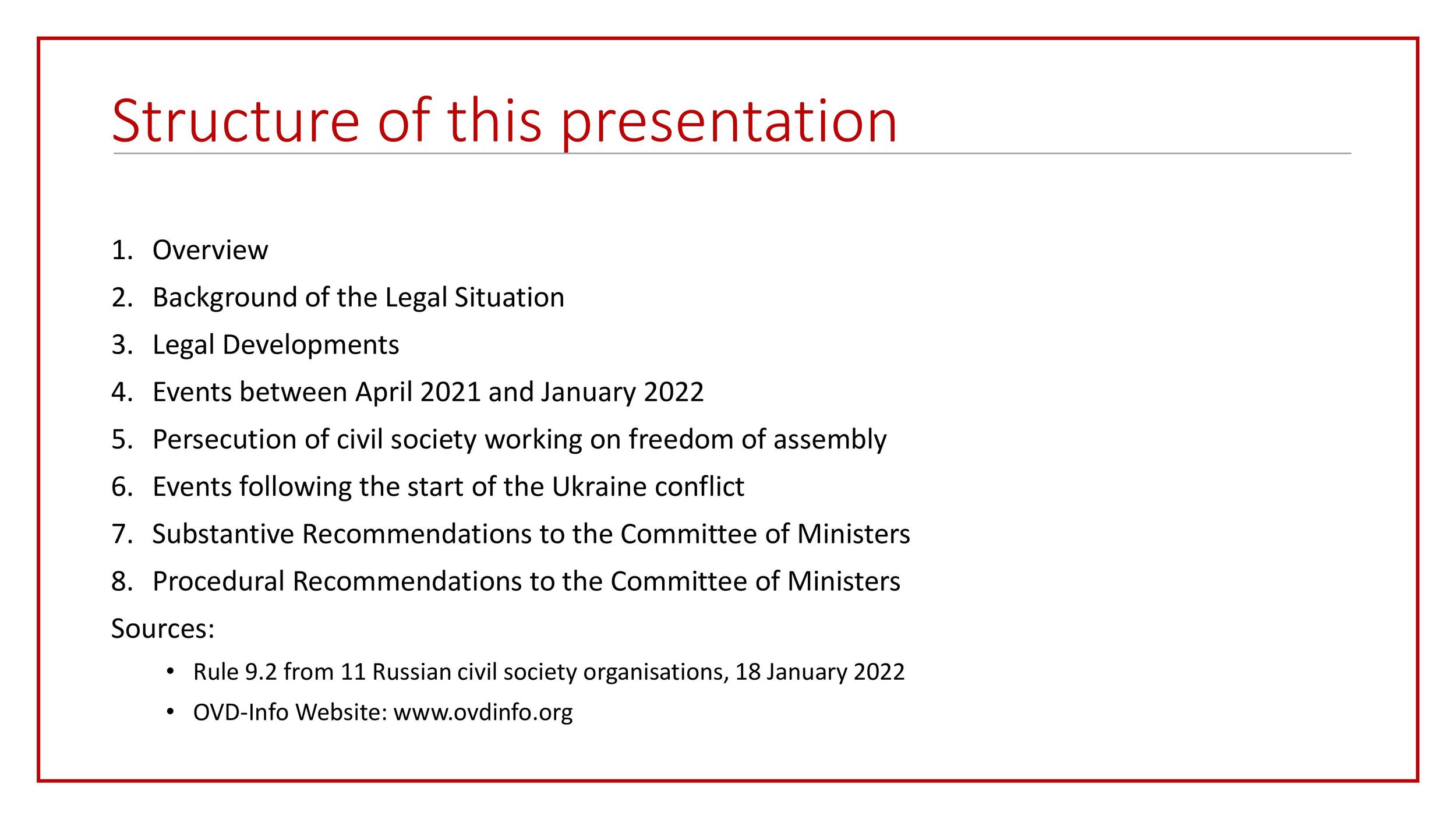
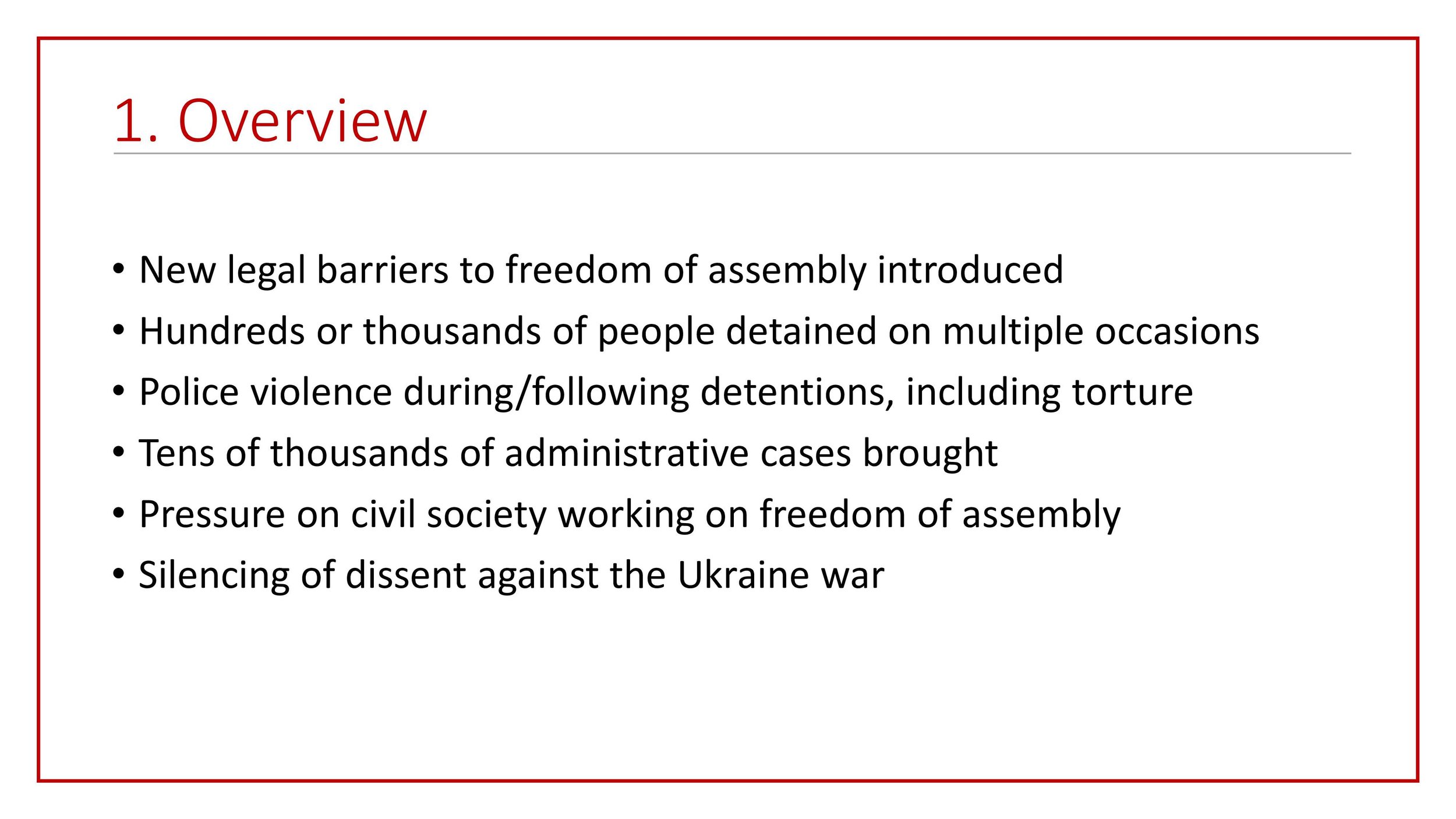
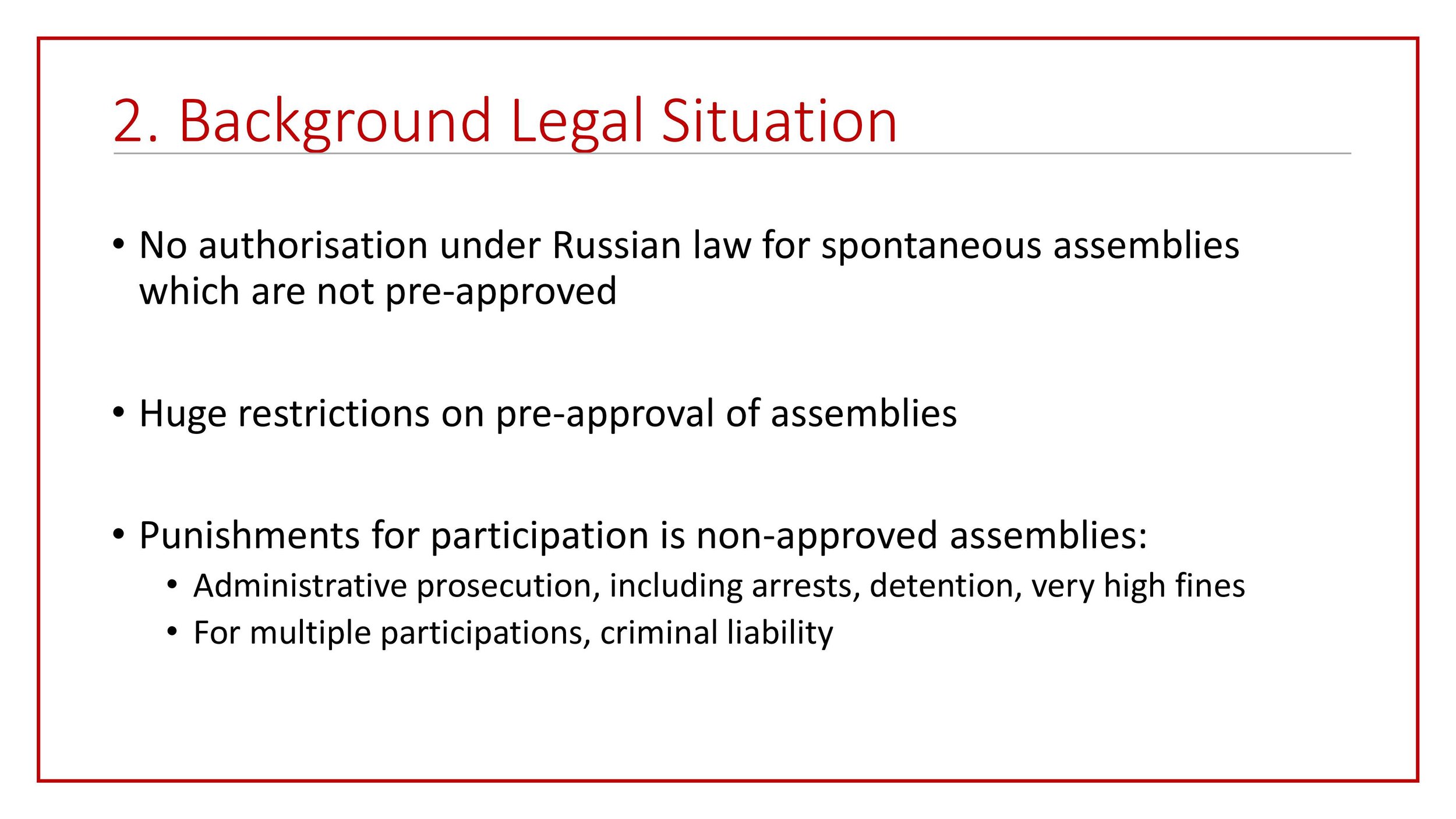
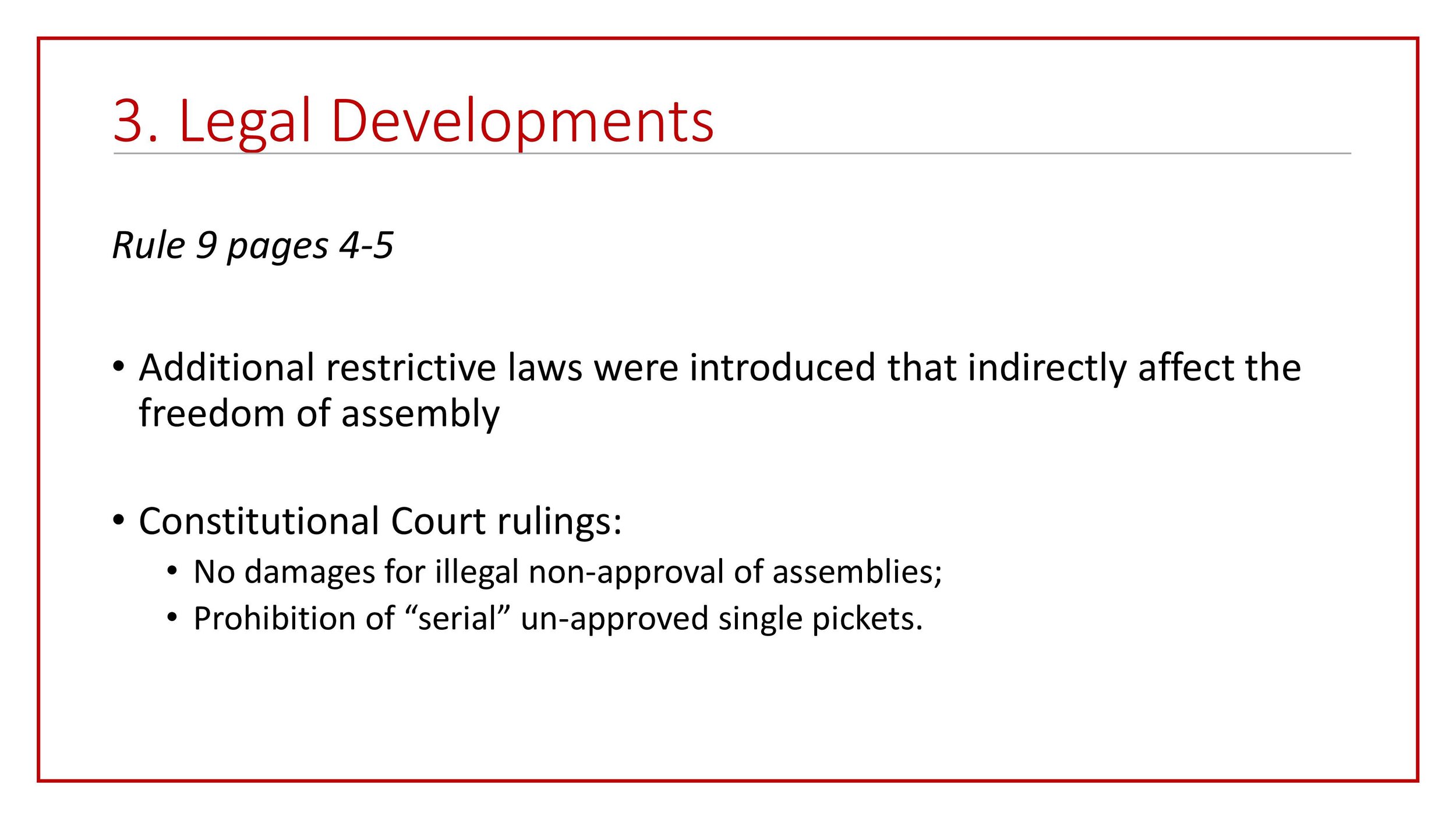
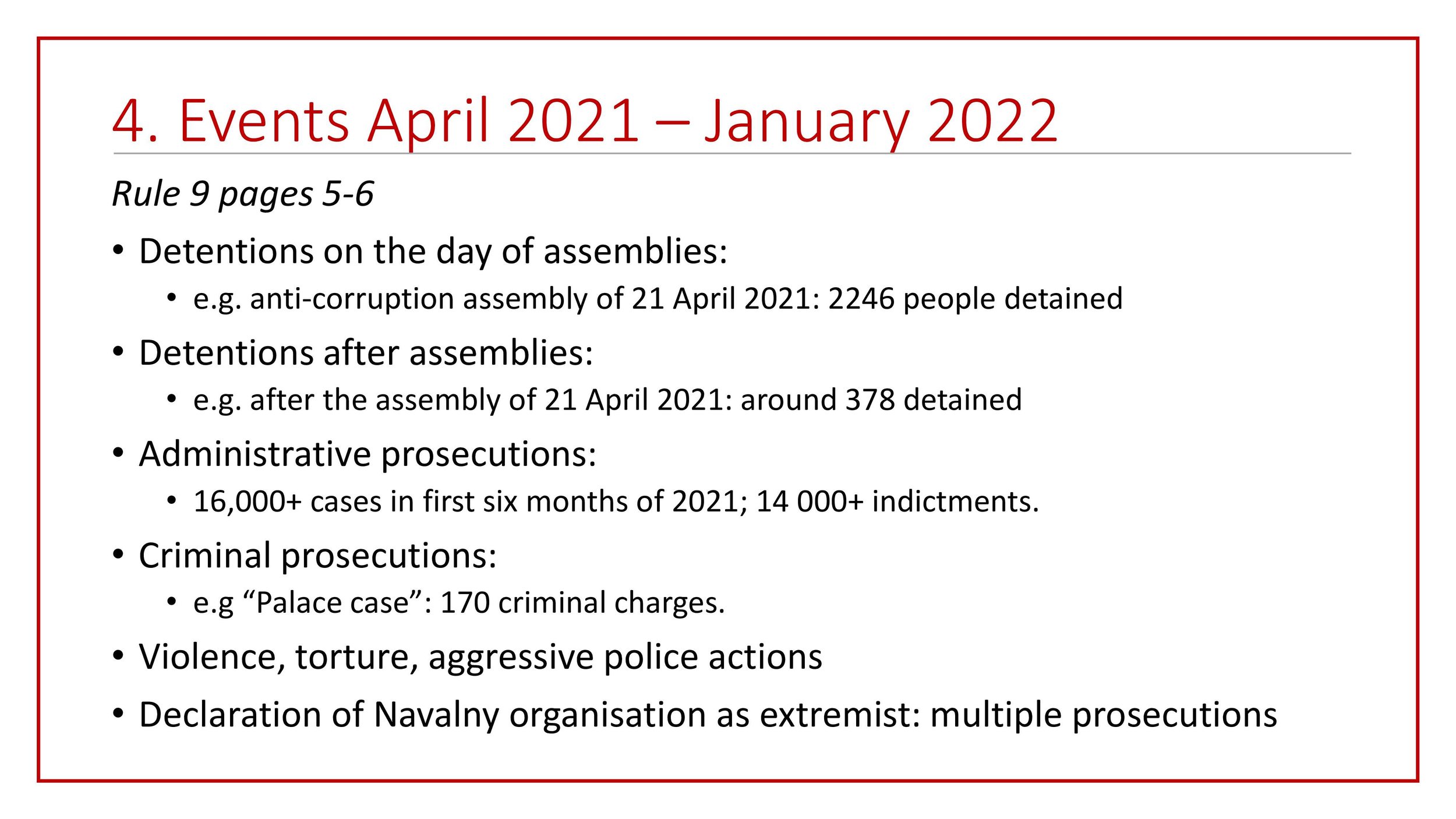
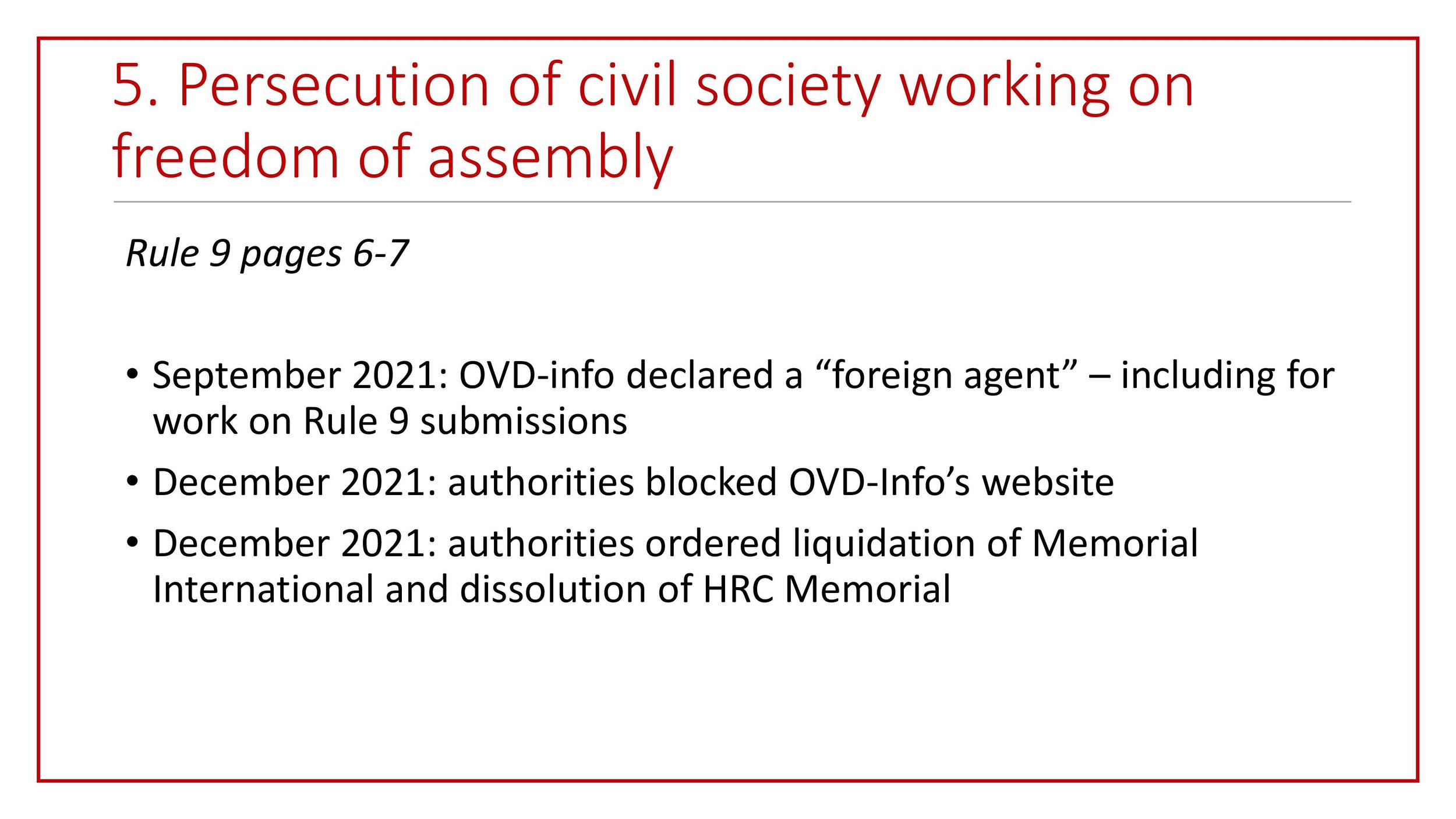
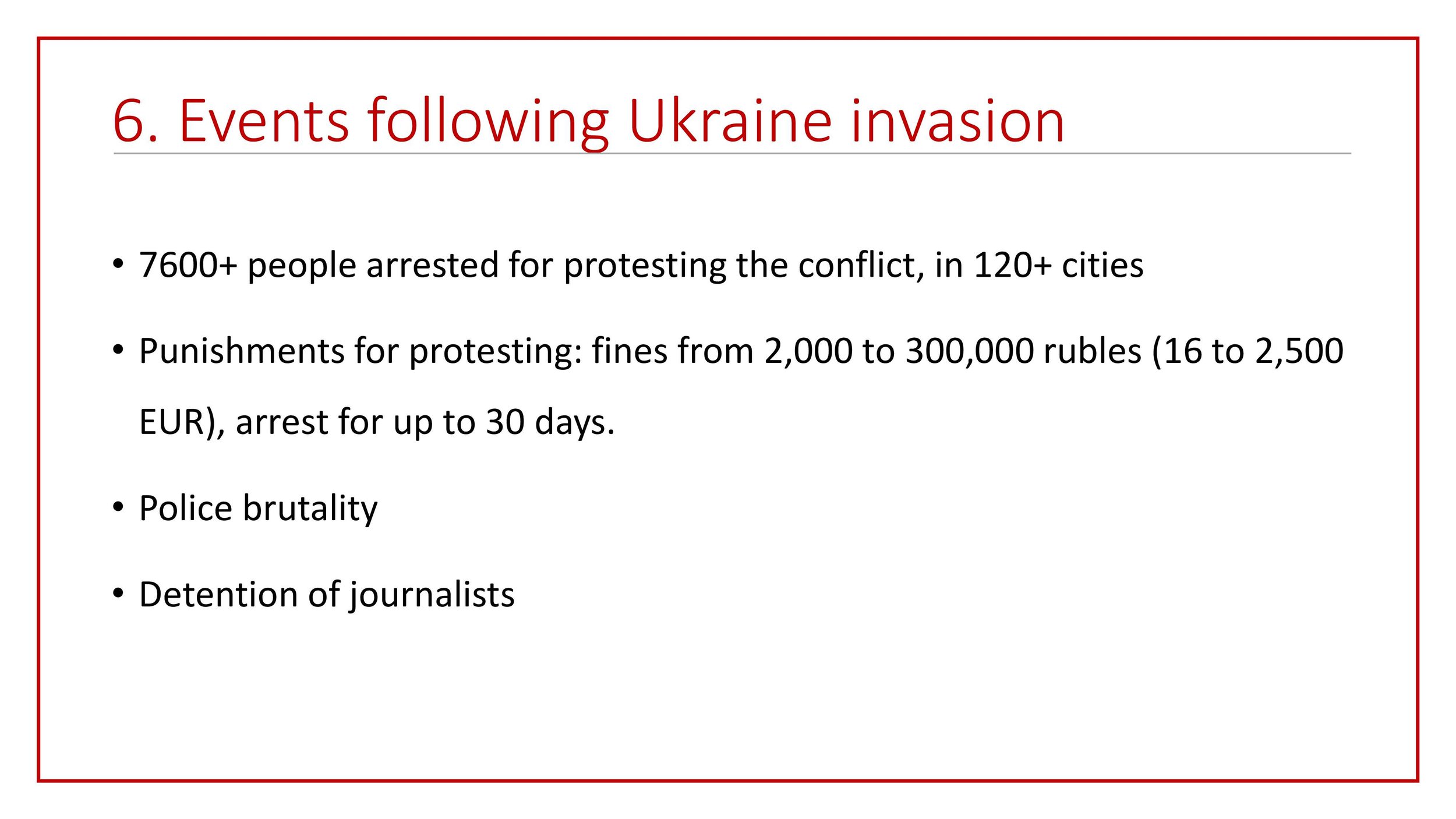
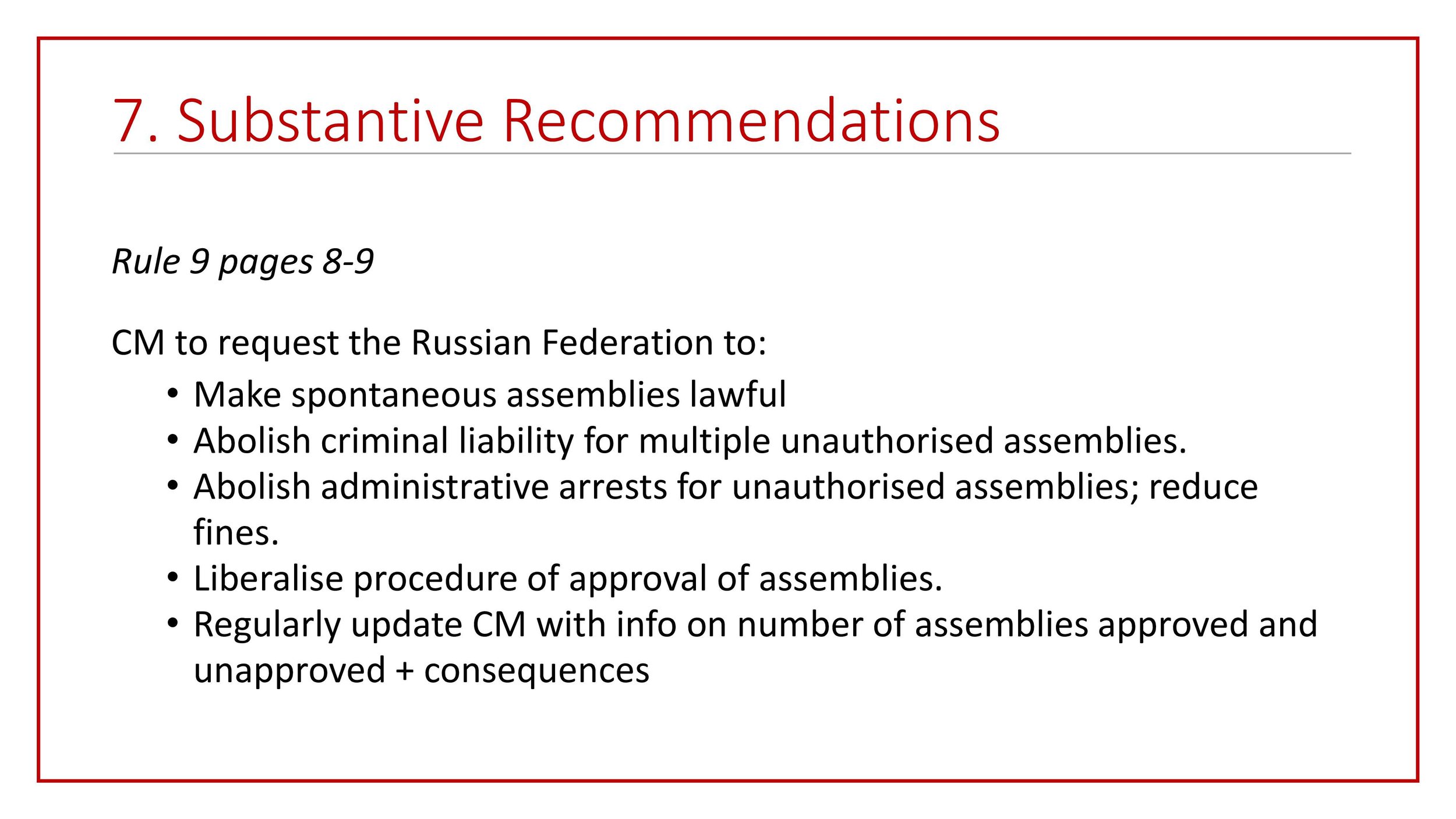
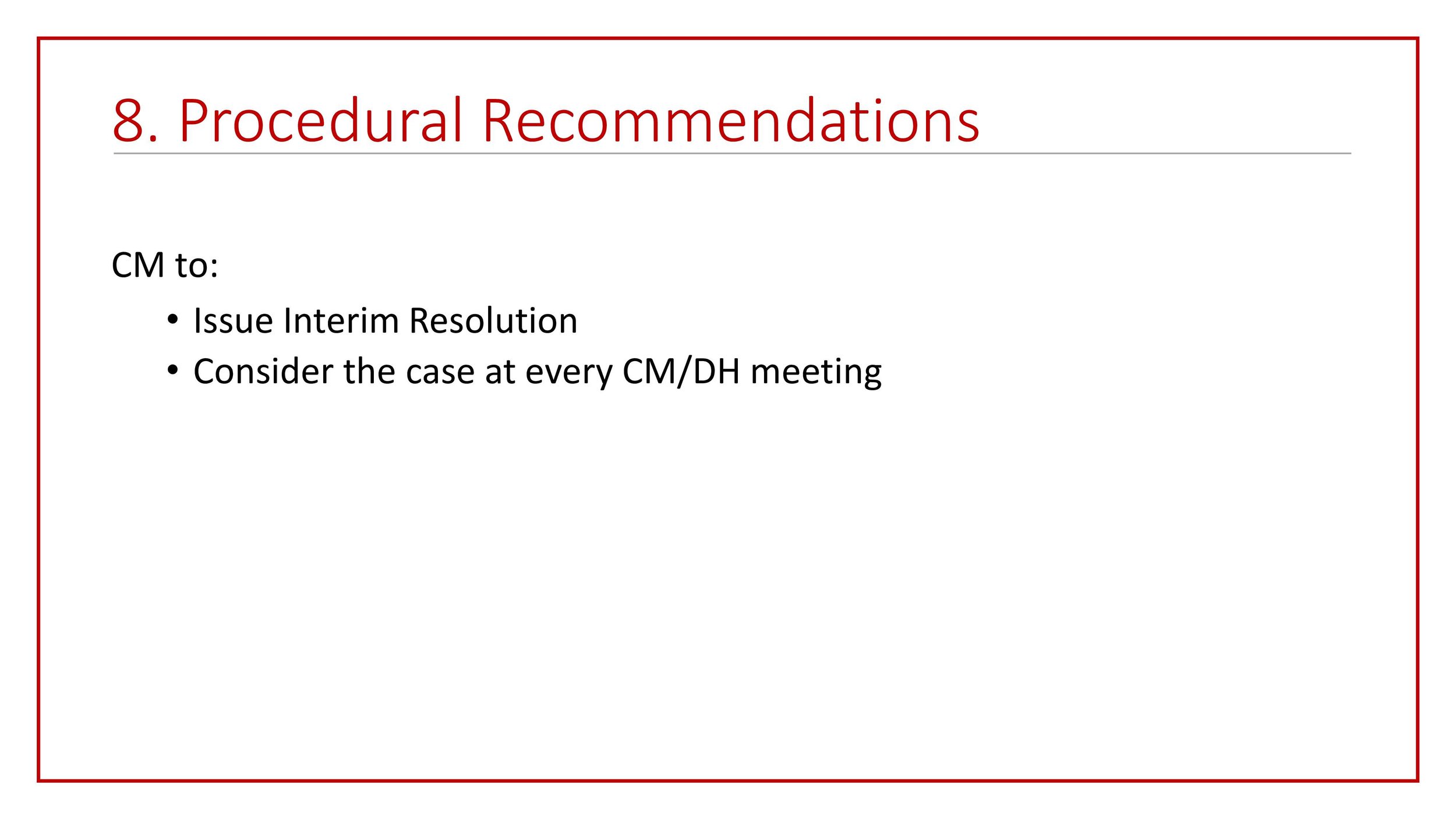

Overview of the Briefing
EIN outlined the background of the legal situation in Russia for participants:
No authorisation under Russian law for spontaneous assemblies which are not pre-approved
Huge restrictions on pre-approval of assemblies
Punishments for participation in non-approved assemblies:
Administrative prosecution, including arrests, detention, very high fines
For multiple participations, criminal liability
Persecution of civil society working on freedom of assembly
September 2021: OVD-info declared a “foreign agent” – including for work on Rule 9 submissions
December 2021: authorities blocked OVD-Info’s website
December 2021: authorities ordered liquidation of Memorial International and dissolution of HRC Memorial
EIN provides the following recommendations from various NGO submissions:
CM to request the Russian Federation to:
Make spontaneous assemblies lawful
Abolish criminal liability for multiple unauthorised assemblies
Abolish administrative arrests for unauthorised assemblies; reduce fines
Liberalise procedure of approval of assemblies
Regularly update CM with information on a number of assemblies approved and unapproved, and consequences
Issue Interim Resolution
Consider the case at every CM/DH meeting
Please see the slides for the full Briefing.
Relevant Information
CM Decisions
Applicant Communications
NGO/NHRI Communications

